By Leen Randell
Updated: Jul 04, 2024
10 Best Herbal Decoctions For Acne
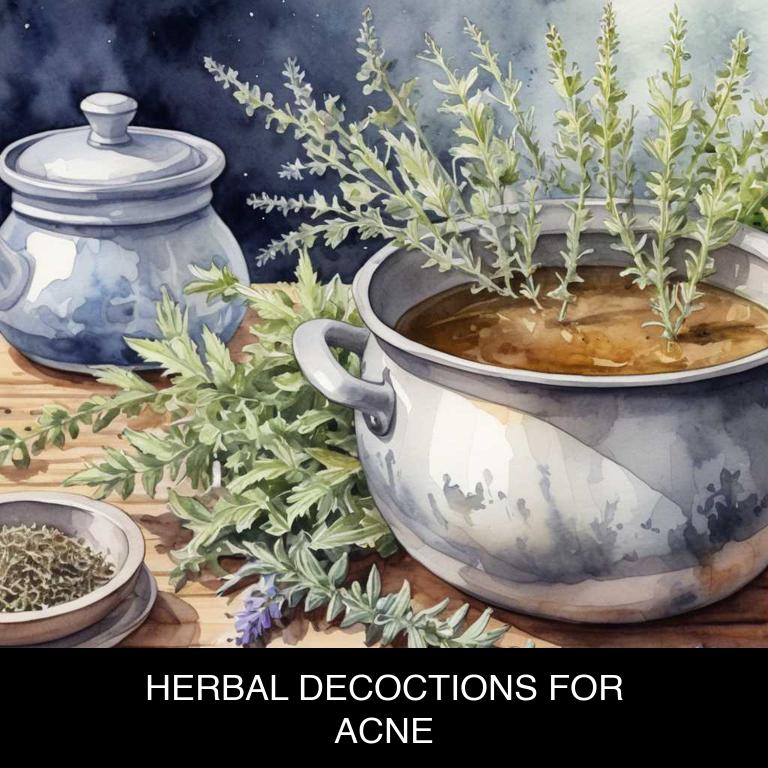
Herbal decoctions for acne are a natural remedy made by steeping herbs in hot water to create a soothing, antiseptic liquid that helps to clear the skin of impurities and reduce inflammation.
This treatment targets the root causes of acne, including excess oil production, bacteria growth, and hormonal imbalances. Examples include teas made from green tea, chamomile, and licorice root, which have anti-inflammatory properties that help to calm redness and swelling.
By incorporating herbal decoctions into their skincare routine, individuals can experience a significant reduction in acne breakouts, leading to clearer, healthier-looking skin and increased confidence.
The following article describes in detail the most important decoctions for acne, including medicinal properties, parts of herbs to use, and recipes for preparations.
- 1. Teucrium chamaedrys
- 2. Calendula officinalis
- 3. Salvia officinalis
- 4. Aloe vera
- 5. Taraxacum officinale
- 6. Matricaria chamomilla
- 7. Geranium maculatum
- 8. Melissa officinalis
- 9. Hypericum perforatum
- 10. Citrus limon
- What is the best combination of herbal decoctions to use for acne?
- What ailments similar to acne are treated with herbal decoctions?
1. Teucrium chamaedrys
Germander decoctions helps with acne because of its potent antibacterial and anti-inflammatory properties.
The decoction's active compounds, including terpenoids and flavonoids, penetrate deep into the skin, targeting the root causes of acne such as clogged pores and inflamed follicles.
By reducing inflammation and killing bacteria that cause breakouts, germander decoctions can help clear up existing pimples and prevent new ones from forming, resulting in a clearer, healthier complexion.
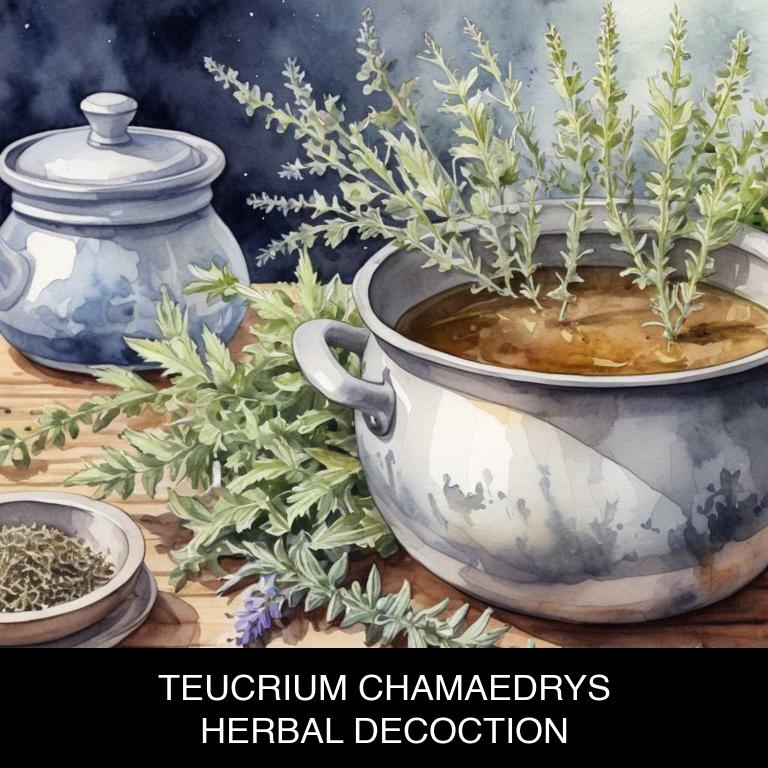
Medicinal Constituents
The list below shows the primary medicinal constituents in Teucrium chamaedrys decoctions that help with acne.
- Diterpenoids: Diterpenoids present in Teucrium chamaedrys decoctions have been shown to exhibit anti-inflammatory properties, which can help reduce inflammation and prevent acne formation.
- Iridoid glycosides: Iridoid glycosides in Teucrium chamaedrys decoctions have been found to possess antimicrobial properties, which can help control bacterial overgrowth on the skin and prevent acne.
- Flavonoids: Flavonoids present in Teucrium chamaedrys decoctions have been reported to have antioxidant and anti-inflammatory properties, which can help protect the skin from damage, reduce inflammation, and prevent acne.
Parts Used
The list below shows the primary parts of germander used to make decoctions for acne.
- Leaves: Used to make decoctions for acne due to their potential antimicrobial properties.
- Flowers: Used to make decoctions for acne due to their potential anti-inflammatory properties.
- Buds: Used to make decoctions for acne due to their potential antimicrobial properties.
Quick Recipe
The following recipe gives a procedure to make a basic germander for acne.
- Harvest 1-2 tablespoons of fresh teucrium chamaedrys leaves and flowers or 1 teaspoon of dried material in the morning.
- Crush the material with a mortar and pestle to release its essential oils and flavors quickly.
- Combine the crushed material with 8 ounces of boiling water in a heat-resistant cup immediately.
- Steep the mixture for 5-7 minutes to allow the active compounds to infuse into the water slowly.
- Strain the decoction through a cheesecloth or a fine-mesh sieve into a clean cup before serving.
2. Calendula officinalis
Pot marigold decoctions helps with acne because of its potent anti-inflammatory and antimicrobial properties.
The decocotion's flavonoids and phenolic acids work to reduce redness and swelling, calming irritated skin and preventing further inflammation. Additionally, the decoction's antibacterial properties help to combat P. acnes bacteria, which can cause clogged pores and acne lesions.
As a result, pot marigold decoctions can effectively soothe and heal acne-prone skin, promoting a clear and radiant complexion.
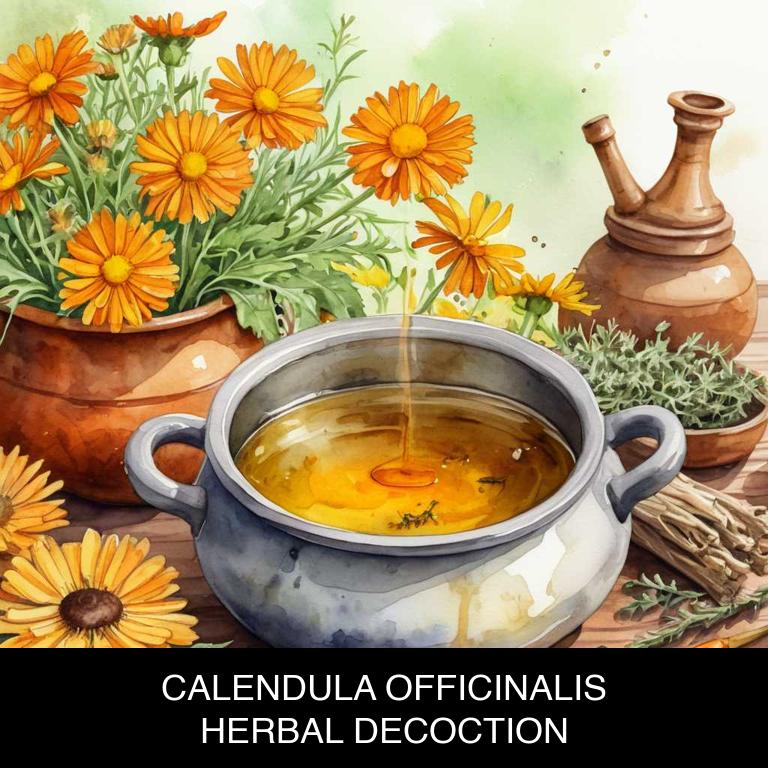
Medicinal Constituents
The list below shows the primary medicinal constituents in Calendula officinalis decoctions that help with acne.
- Saponins: These triterpenoid compounds help reduce inflammation and antimicrobial activity, which can help alleviate acne symptoms.
- Carotenoids: As powerful antioxidants, these carotenoids help protect the skin from oxidative stress and damage, reducing the severity of acne.
- Triterpenoid acids: These compounds exhibit anti-inflammatory and antimicrobial properties, which can help control acne-causing bacteria and reduce inflammation.
Parts Used
The list below shows the primary parts of pot marigold used to make decoctions for acne.
- Flowers: These are the most commonly used part due to their high content of triterpenoid saponins and carotenoids, which have anti-inflammatory and antioxidant properties that help soothe and calm acne-prone skin.
- Leaves: The leaves are also used for their antiseptic and anti-inflammatory properties, which can help reduce redness and inflammation associated with acne.
- Stems: The stems contain flavonoids and carotenoids that contribute to their anti-inflammatory and antioxidant effects, which can aid in the treatment of acne by reducing inflammation and promoting skin health.
Quick Recipe
The following recipe gives a procedure to make a basic pot marigold for acne.
- Harvest 1/4 cup of calendula flowers when in full bloom and dry them in a warm dark place for 1-2 weeks.
- Measure out 1 teaspoon of dried flowers and combine them with 1 cup of boiling water in a heat-resistant cup.
- Allow the mixture to steep for 5-10 minutes before straining it through a fine-mesh sieve into a separate container.
- Discard the solids and add honey to taste to sweeten the decoction if desired.
- Store the decoction in a cool dark place for up to 24 hours before consuming it.
3. Salvia officinalis
Sage decoctions helps with acne because of its potent antibacterial properties, which effectively combat Propionibacterium acnes (P. acnes) bacteria that cause inflammation and clog pores.
The antioxidants in sage also reduce oxidative stress and inflammation, calming the skin and preventing further breakouts. Additionally, sage's astringent properties help to shrink enlarged pores, allowing for clearer and more even-toned skin.
By incorporating sage decoctions into one's skincare routine, individuals can expect a reduction in acne severity and improved overall skin health.
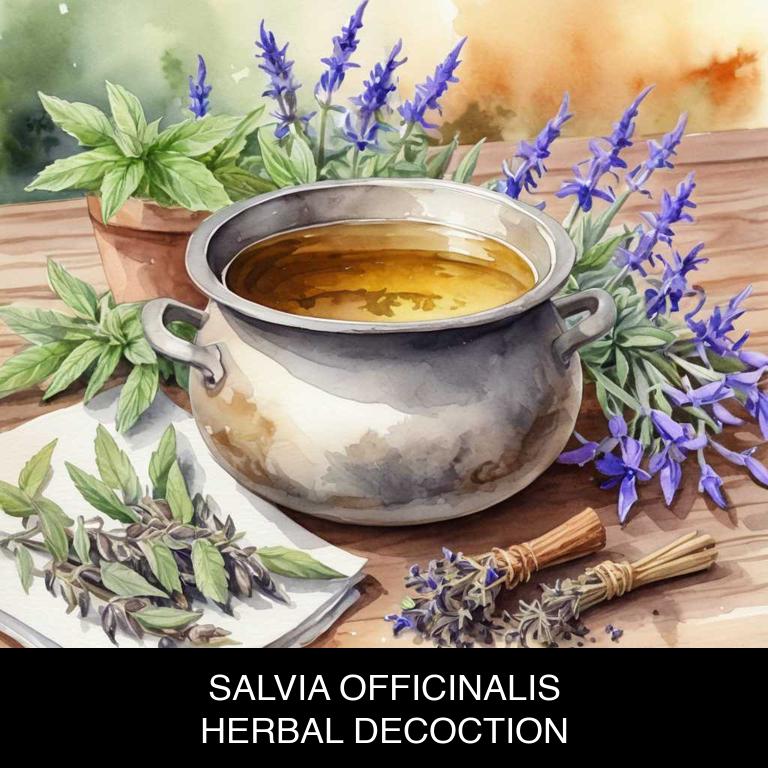
Medicinal Constituents
The list below shows the primary medicinal constituents in Salvia officinalis decoctions that help with acne.
- Triterpenes: Triterpenes present in Salvia officinalis decoctions have anti-inflammatory properties, which can help reduce the inflammation associated with acne.
- Rosmarinic acid: Rosmarinic acid has antioxidant and antimicrobial properties, which can help protect the skin from environmental stressors and reduce the growth of acne-causing bacteria.
- Carnosic acid: Carnosic acid has potent antioxidant properties, which can help neutralize free radicals and reduce oxidative stress, a factor that contributes to acne development.
Parts Used
The list below shows the primary parts of sage used to make decoctions for acne.
- Leaves: Rich in antioxidants and anti-inflammatory compounds, they help soothe and calm acne-prone skin.
- Roots: Containing antimicrobial properties, they aid in reducing bacterial growth and inflammation associated with acne.
- Flowers: Exhibiting antiseptic and antifungal properties, they help combat infections and promote healthy skin.
Quick Recipe
The following recipe gives a procedure to make a basic sage for acne.
- Gather 1-2 teaspoons of dried salvia officinalis leaves and 1 cup of boiling water for infusion.
- Combine the herb with boiling water in a heat-resistant container and steep for 5-7 minutes.
- Strain the mixture through a cheesecloth or fine-mesh sieve into a cup or jug.
- Discard the solids and let the liquid cool to room temperature for 30 minutes.
- Store the decoction in an airtight container in the refrigerator for up to 3 days.
4. Aloe vera
Aloe decoctions helps with acne because of its anti-inflammatory and antibacterial properties, which work to reduce redness and swelling associated with acne.
The aloe vera gel soothes and calms the skin, reducing inflammation and irritation that can exacerbate breakouts. Additionally, the antibacterial agents in aloe help to combat Propionibacterium acnes (P. acnes) bacteria, a common cause of acne, thereby reducing the appearance of acne scars and preventing future breakouts.
As a result, herbal aloe decoctions provide a natural and effective solution for managing acne-prone skin.
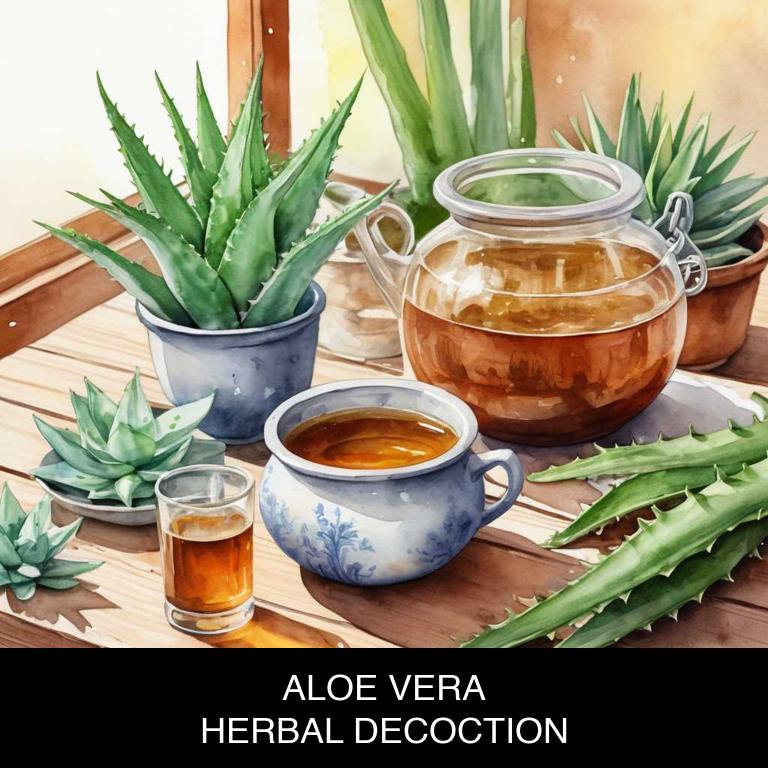
Medicinal Constituents
The list below shows the primary medicinal constituents in Aloe vera decoctions that help with acne.
- Aloe-emodin: This anthraquinone derivative has anti-inflammatory and antibacterial properties, which help reduce redness, swelling, and the growth of acne-causing bacteria.
- Catechins: These flavonoid antioxidants have anti-inflammatory and antimicrobial effects, which help reduce oxidative stress, inflammation, and the proliferation of Propionibacterium acnes (P. acnes) bacteria.
- Glycoproteins and mucopolysaccharides: These polysaccharide-rich compounds have anti-inflammatory and soothing properties, which help calm irritated skin, reduce inflammation, and promote wound healing.
Parts Used
The list below shows the primary parts of aloe used to make decoctions for acne.
- Leaves: They are the most commonly used part due to their high concentration of aloe-emodin, a compound that has antibacterial and anti-inflammatory properties.
- Roots: The roots contain aloin, a compound that has anti-inflammatory and antibacterial properties, making them effective in reducing acne inflammation.
- Stems: The stems are a good source of aloe-gelatin, a compound that helps to soothe and calm the skin, reducing acne redness and irritation.
Quick Recipe
The following recipe gives a procedure to make a basic aloe for acne.
- Harvest 5-6 mature aloe vera leaves from a healthy plant with minimal exposure to direct sunlight.
- Remove the outer skin and inner gel of the aloe vera leaves using a sharp knife.
- Weigh out 20 grams of the aloe vera gel and add it to 100 milliliters of boiling water.
- Reduce heat to a simmer for 10-15 minutes allowing the mixture to infuse and reduce.
- Strain the decoction using a cheesecloth or fine-mesh sieve and discard the solids.
5. Taraxacum officinale
Dandelion decoctions helps with acne because of its potent antimicrobial properties, which effectively combat the bacteria that cause acne.
The decoction also has anti-inflammatory compounds that reduce redness and swelling associated with acne. Additionally, dandelion's detoxifying effects help to flush out toxins and excess hormones from the skin, which can contribute to acne.
As a result, regular consumption of dandelion decoctions may lead to a noticeable reduction in acne severity and frequency, promoting clear and healthy-looking skin.

Medicinal Constituents
The list below shows the primary medicinal constituents in Taraxacum officinale decoctions that help with acne.
- Polysaccharides: Help with acne by reducing inflammation and modulating the immune response, which can help to alleviate redness and swelling associated with acne.
- Apigenin: Help with acne by exhibiting antibacterial and anti-inflammatory properties, which can help to combat acne-causing bacteria and reduce the severity of acne symptoms.
- Taraxasterol: Help with acne by exhibiting anti-inflammatory and antioxidant properties, which can help to reduce inflammation and oxidative stress associated with acne, and promote healing of damaged skin.
Parts Used
The list below shows the primary parts of dandelion used to make decoctions for acne.
- Leaves: They are used due to their anti-inflammatory properties, which help reduce redness and swelling associated with acne.
- Flowers: They are used due to their antibacterial properties, which help combat acne-causing bacteria and promote healing.
- Roots: They are used due to their antioxidant properties, which help reduce oxidative stress and prevent damage to skin cells.
Quick Recipe
The following recipe gives a procedure to make a basic dandelion for acne.
- Gather 1 cup of fresh taraxacum officinale roots, or 2 tablespoons of dried roots, for decoction.
- Rinse the roots under cold running water, then chop them into small pieces, 1 inch long.
- Combine the chopped roots with 2 cups of water in a saucepan, bring to a boil.
- Reduce heat to a simmer and let the mixture steep for 10 to 15 minutes, or until the liquid is reduced by half.
- Strain the decoction through a cheesecloth or a fine-mesh sieve into a clean container, discard the solids.
6. Matricaria chamomilla
Chamomile decoctions helps with acne because of its anti-inflammatory and antibacterial properties.
The apigenin present in chamomile has been shown to reduce inflammation, which is a major contributor to acne. Additionally, the flavonoids and terpenoids in chamomile have antimicrobial effects that help combat Propionibacterium acnes (P. acnes) bacteria, a common cause of acne.
By reducing inflammation and killing bacteria, chamomile decoctions can help to soothe and clear up acne-prone skin, leaving it looking healthier and more radiant.
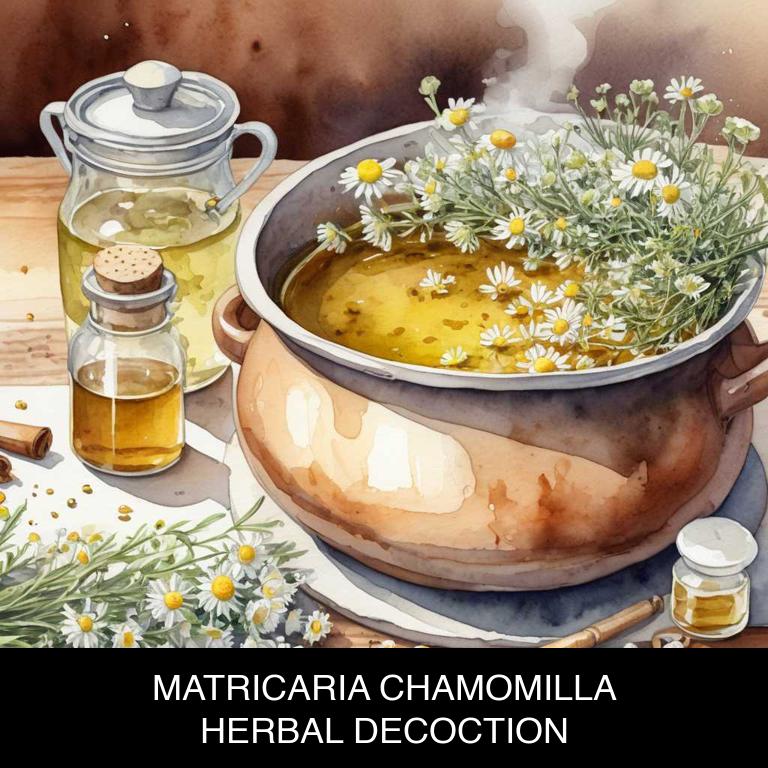
Medicinal Constituents
The list below shows the primary medicinal constituents in Matricaria chamomilla decoctions that help with acne.
- Apigenin: This flavonoid helps with acne by reducing inflammation and oxidative stress, which can contribute to acne development and severity.
- Chrysin: This flavonoid has anti-inflammatory and antimicrobial properties, which can help to reduce acne-causing bacteria and inflammation in the skin.
- Α-bisabolol: This sesquiterpene has anti-inflammatory and antioxidant properties, which can help to soothe and calm the skin, reducing redness and inflammation associated with acne.
Parts Used
The list below shows the primary parts of chamomile used to make decoctions for acne.
- Flowers: They are used due to their high anti-inflammatory and soothing properties, which help to calm and reduce acne inflammation.
- Leaves: They are used for their antimicrobial and antiseptic properties, which help to prevent bacterial growth and reduce acne breakouts.
- Seeds: They are used due to their antioxidant and anti-inflammatory properties, which help to reduce inflammation and promote skin healing in acne-prone skin.
Quick Recipe
The following recipe gives a procedure to make a basic chamomile for acne.
- Harvest the aerial parts of matricaria chamomilla at full bloom with a sharp pair of scissors.
- Dry the harvested aerial parts in a warm ventilated area for 2 days to 1 week.
- Measure out 1 to 2 teaspoons of dried aerial parts for every 8 ounces of water.
- Steep the dried aerial parts in boiling water for 5 to 10 minutes.
- Strain the decoction through a cheesecloth or fine-mesh sieve into a clean container.
7. Geranium maculatum
Wild geranium decoctions helps with acne because of its potent antibacterial, anti-inflammatory, and antioxidant properties.
The decoction's ability to reduce inflammation and fight off bacteria that cause pimples and acne can lead to a significant reduction in acne lesions. Additionally, wild geranium has natural antiseptic and antimicrobial properties that help to clean the skin, unclog pores, and regulate sebum production, thereby preventing future breakouts.
By incorporating wild geranium decoctions into one's skincare routine, individuals may experience a noticeable improvement in their acne-prone skin.
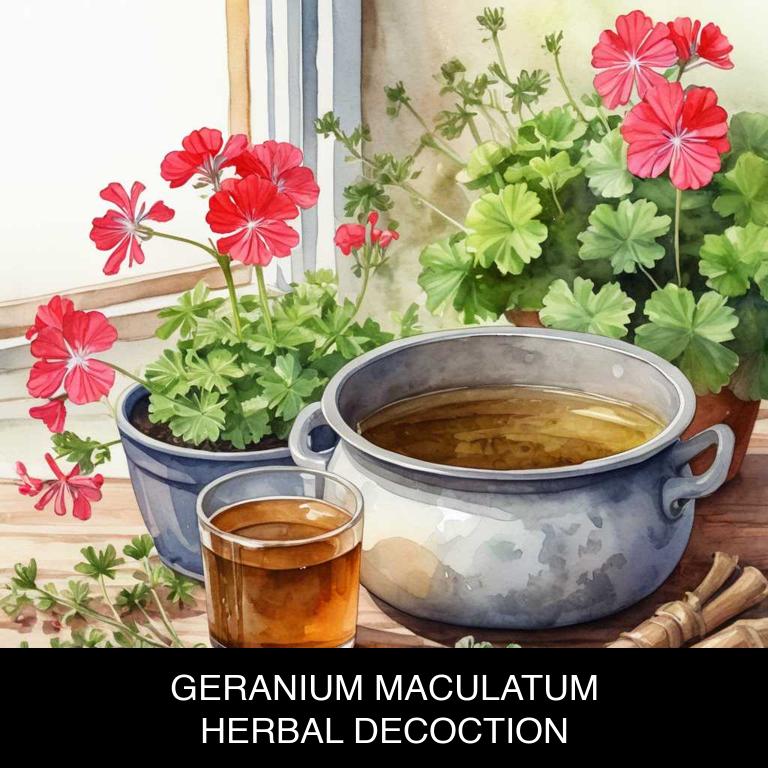
Medicinal Constituents
The list below shows the primary medicinal constituents in Geranium maculatum decoctions that help with acne.
- Flavonoids: These plant compounds help reduce inflammation and prevent bacterial growth, which can contribute to acne development.
- Phenolic acids: They exhibit antimicrobial properties, inhibiting the growth of bacteria such as Propionibacterium acnes (P. acnes), a common cause of acne.
- Tannins: These astringent compounds can help reduce sebum production, preventing clogged pores and minimizing the occurrence of acne.
Parts Used
The list below shows the primary parts of wild geranium used to make decoctions for acne.
- Roots: The roots of Geranium maculatum are often used due to their high concentration of geraniin, a compound believed to have antibacterial properties that can help combat acne-causing bacteria.
- Leaves: The leaves are utilized for their antiseptic and anti-inflammatory properties, which can aid in reducing redness and swelling associated with acne.
- Flowers: The flowers are used for their astringent properties, which can help to tighten pores and reduce the appearance of acne.
Quick Recipe
The following recipe gives a procedure to make a basic wild geranium for acne.
- Gather 1-2 teaspoons of dried geranium maculatum root and leaves for the decoction.
- Combine the dried plant material with 8 ounces of boiling water in a heat-resistant container.
- Steep the mixture for 5-10 minutes to allow the plant compounds to infuse into the water.
- Strain the decoction through a cheesecloth or fine-mesh sieve into a clean container.
- Discard the solids and store the decoction in the refrigerator for up to 24 hours.
8. Melissa officinalis
Lemon balm decoctions helps with acne because it contains rosmarinic acid, a potent antioxidant that reduces inflammation in the skin.
This natural anti-inflammatory agent soothes redness and swelling associated with acne, while also combating P. acnes bacteria that cause breakouts. Additionally, lemon balm's antiseptic properties help to purify the skin, reducing the appearance of pores and preventing future breakouts.
By harnessing the power of nature, lemon balm decoctions provide a holistic solution for addressing acne-prone skin.
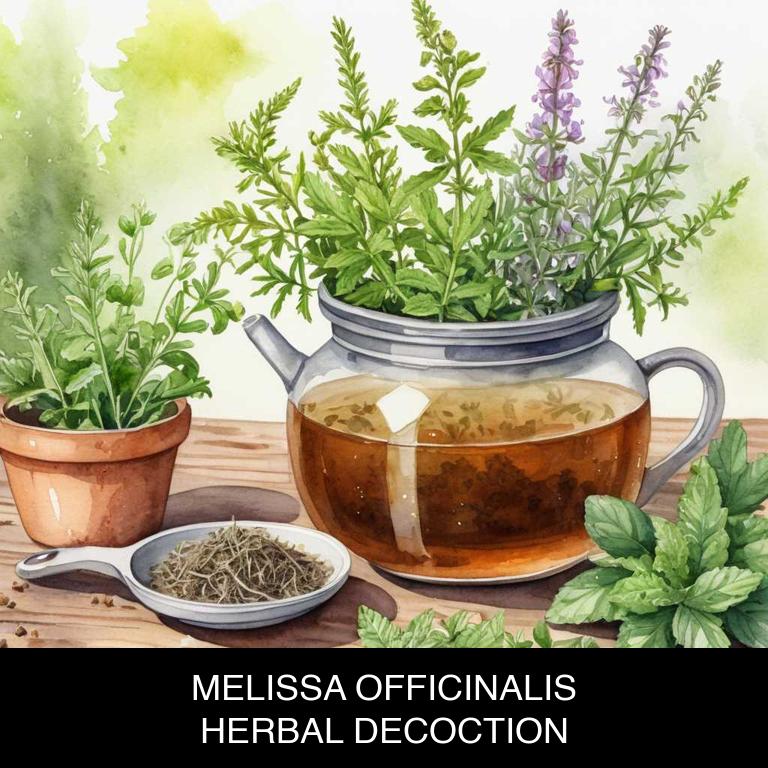
Medicinal Constituents
The list below shows the primary medicinal constituents in Melissa officinalis decoctions that help with acne.
- Rosmarinic acid: This phenolic compound helps reduce acne by inhibiting the production of pro-inflammatory enzymes, thereby reducing inflammation and oxidative stress associated with acne.
- Melissic acid: This phenolic compound exhibits antimicrobial properties, which can help reduce the growth of acne-causing bacteria, such as Propionibacterium acnes (P. acnes), on the skin.
- Limonene: This terpene has anti-inflammatory properties and can help modulate the immune response, reducing the severity of acne symptoms, including redness and swelling.
Parts Used
The list below shows the primary parts of lemon balm used to make decoctions for acne.
- Leaves: Rich in antioxidants and flavonoids, which help to reduce inflammation and combat bacterial infections that cause acne.
- Flowers: Contain antimicrobial and anti-inflammatory properties that help to soothe and calm the skin, reducing acne symptoms.
- Roots: Possess anti-inflammatory and antibacterial properties that help to reduce redness and fight acne-causing bacteria.
Quick Recipe
The following recipe gives a procedure to make a basic lemon balm for acne.
- Gather 1-2 teaspoons of dried melissa officinalis leaves or 3-4 fresh leaves for decoction.
- Combine the gathered melissa officinalis leaves with 1 cup of boiling water for 5-7 minutes.
- Strain the liquid through a cheesecloth or fine-mesh sieve into a bowl or teapot.
- Discard the solids and let the decoction cool to room temperature within 30 minutes.
- Store the cooled decoction in a glass bottle in the refrigerator for up to 3 days.
9. Hypericum perforatum
St John's wort decoctions helps with acne because of its potent anti-inflammatory and antimicrobial properties.
The herb's active compounds, such as hyperforin and hypericin, have been shown to reduce inflammation in the skin, which is often a contributing factor to acne. Additionally, St John's wort has natural antibacterial properties that help to combat Propionibacterium acnes (P. acnes), the bacteria responsible for causing acne.
By reducing inflammation and killing P. acnes, St John's wort decoctions can help to clear up acne-prone skin and prevent future breakouts.
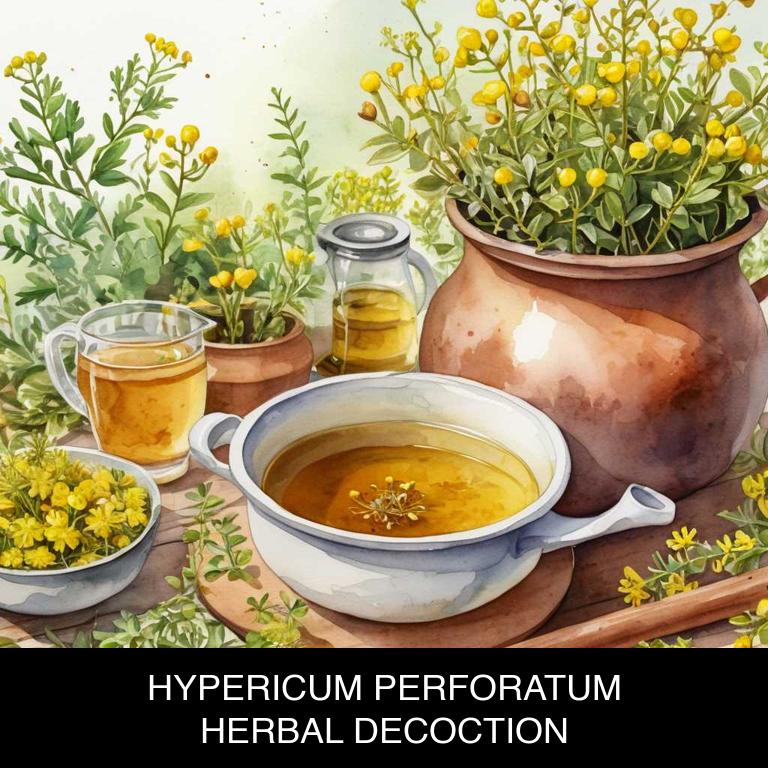
Medicinal Constituents
The list below shows the primary medicinal constituents in Hypericum perforatum decoctions that help with acne.
- Naphthodianthrones: These compounds have anti-inflammatory and antimicrobial properties, which can help reduce acne-causing bacteria and inflammation on the skin.
- Flavonoids: These flavonoids possess antioxidant and anti-inflammatory effects, which can help protect the skin from oxidative stress and inflammation caused by acne.
- Tannins: These tannins exhibit antimicrobial and astringent properties, which can help reduce acne-causing bacteria and prevent post-inflammatory hyperpigmentation (PIH) associated with acne.
Parts Used
The list below shows the primary parts of st john's wort used to make decoctions for acne.
- Leaves: Leaves are the most commonly used part due to their high concentration of flavonoids, which have anti-inflammatory and antimicrobial properties that help to combat acne.
- Flowers: Flowers are used due to their high content of flavonoids and anthraquinones, which help to reduce inflammation and prevent the growth of bacteria that can cause acne.
- Stems: Stems are used due to their high concentration of flavonoids and phenolic acids, which have anti-inflammatory and antioxidant properties that help to soothe and calm acne-prone skin.
Quick Recipe
The following recipe gives a procedure to make a basic st john's wort for acne.
- Harvest fresh hypericum perforatum flowers and leaves in the early morning after the dew has evaporated.
- Dry the harvested plant material in a warm dark place for at least two weeks or use a dehydrator.
- Crush the dried hypericum perforatum flowers and leaves into a fine powder using a mortar and pestle.
- Combine 1-2 teaspoons of the powdered plant material with 1 cup of boiling water to make a decoction.
- Allow the decoction to steep for 10-15 minutes before straining and serving.
10. Citrus limon
Lemon decoctions helps with acne because they possess antiseptic, antibacterial, and anti-inflammatory properties that work synergistically to combat acne-causing bacteria and reduce inflammation.
The antioxidants present in herbs like peppermint, chamomile, and calendula also help to soothe the skin, reducing redness and irritation. Additionally, lemon decoctions can help to balance the pH of the skin, unclog pores, and promote healthy skin cell turnover, resulting in a clearer, more radiant complexion.
This natural remedy is a gentle and effective way to address acne concerns without harsh chemicals or invasive treatments.
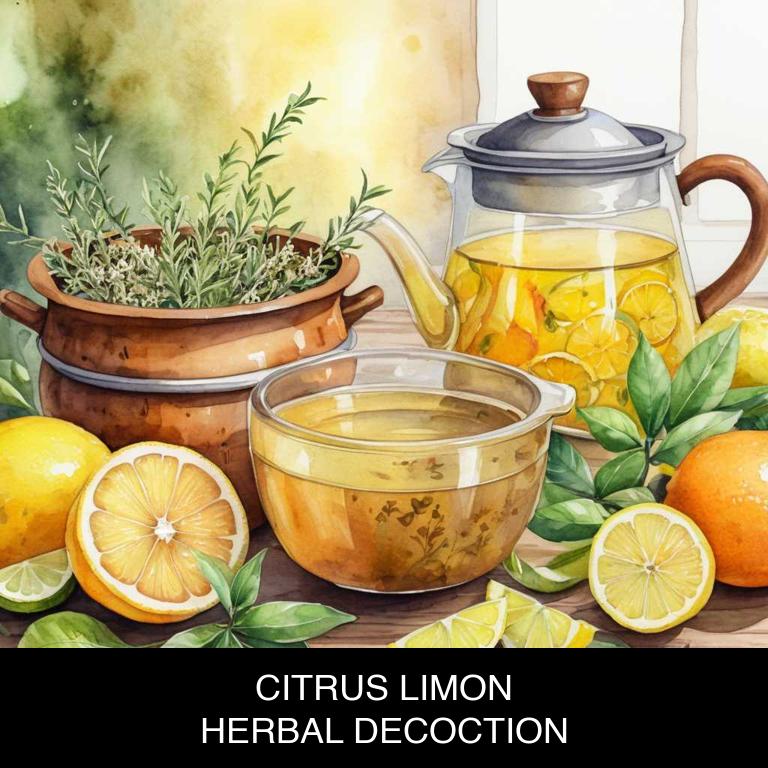
Medicinal Constituents
The list below shows the primary medicinal constituents in Citrus limon decoctions that help with acne.
- Naringenin: This flavonoid helps reduce inflammation and oxidative stress, which are key factors in the development and progression of acne.
- Nootkatone: This sesquiterpene has anti-inflammatory and antimicrobial properties, which help combat acne-causing bacteria and reduce redness and swelling.
- Limonene: This monoterpene has antioxidant and anti-inflammatory effects, which help protect the skin from damage, reduce inflammation, and prevent the formation of acne.
Parts Used
The list below shows the primary parts of lemon used to make decoctions for acne.
- Leaves: The leaves of Citrus limon contain antiseptic properties that help to prevent the growth of bacteria and reduce inflammation associated with acne.
- Fruits: The juice of the fruits, particularly the peel, is known for its astringent and antiseptic properties, which help to dry out pimples and reduce inflammation.
Quick Recipe
The following recipe gives a procedure to make a basic lemon for acne.
- Harvest 1-2 fresh lemons, wash them thoroughly to remove dirt and bacteria from their surface.
- Peel the lemons using a vegetable peeler or a sharp knife to release their oil glands.
- Dry the lemon peels in a low-temperature oven at 150 degrees fahrenheit for 1-2 hours.
- Combine 1 teaspoon of dried lemon peels with 1 cup of boiling water to create a decoction.
- Steep the mixture for 10-15 minutes, then strain and discard the solids to obtain the final decoction.
What is the best combination of herbal decoctions to use for acne?
The best combination of herbal decoctions that help with acne is a blend of neem, turmeric, and tea tree.
Neem's anti-inflammatory properties soothe redness and prevent infection, while turmeric's curcumin reduces inflammation and fights bacterial growth. Tea tree oil, rich in antiseptic properties, kills acne-causing bacteria and promotes healing. This combination not only reduces acne severity but also helps prevent future breakouts.
Additionally, its antioxidant properties protect the skin from environmental damage, promoting overall skin health and clarity.
What ailments similar to acne are treated with herbal decoctions?
Ailments similar to acne/decoctions.html">acne/decoctions.html">acne that are treated with herbal decoctions are eczema, rosacea, and dermatitis.
Herbal decoctions containing ingredients like turmeric, ginger, and licorice root can help soothe and calm irritated skin, reducing inflammation and redness. Other herbs like neem, tea tree, and chamomile may be used to treat acne-like symptoms such as hyperpigmentation and scarring.
These natural remedies promote healthy skin and reduce the appearance of blemishes and imperfections.